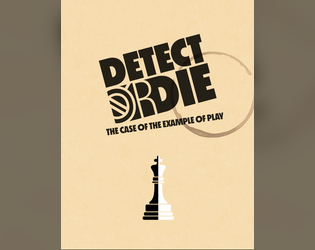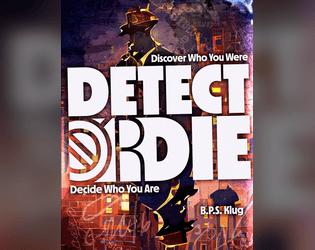My advice on that front is just to have more clues than you need, and so if they miss a few juicy ones it's not the end of the world. You can tell them after they solve the Case! There's a Reconstructure expertise, if I remember my own writing correctly, that also lets them know if they haven't found any clues you had pre-written.
If they absolutely need a clue, force it (offer them a roll where no matter what, they find the clue, but a bad roll stings a bit) as discussed above. Missed clues are actually good, because they mean the players genuinely get to carve out their own path through the mystery - as long as there's enough clues to get there in the end. You may have to generate some on the fly to make sure, but again that helps the players take ownership of their solution.
Silk & Stone
Creator of
Recent community posts
Oh, and as a second suggestion: Consider having them roll, but the roll is to determine if they get Deja Vu, or the World gets Deja Vu, or Morale or whatnot, and the Clue happens either way. This can be usefully be framed as 'do you easily find and digest this detail, or does it take you a moment or remind you of something you don't want to remember, in an inchoate way.'
It's a good way to split the difference between knowing they really need the Clue and wanting it to be something they can engage with.
Hey Zeedox, thanks for checking it out!
I've been working on my first full Case File, The Case of the Signal Fire, and I hope that the back half of the book contains some useful Case framing advice. There's also the Case of the Example of Play, which is an example of play for the game but also could be a scenario seed to build on.
My big practical piece of advice would be that the Detective's own past can be relatively simple - and so can the Case, given the Detective's significant challenges (amnesia, etc). They'll also get more complicated when the Detective players (and the World) add in more details over time. Also, steal from movies and books! Grab a fun murder mystery, then make it much easier to solve (double or triple up on clues, make sure the Detective has many more ways to figure it out than in a Sherlock Holmes story, and be prepared to toss Investigation rolls to players that snap things together when they need it).
Another piece of advice is that the amnesia doesn't necessarily have to be a direct result of the Case. Two of my playtest cases had the Detective's amnesia be a direct result of the main plot, but another three involved coincidental amnesia - the classic 'bonked on the head' option from some investigation, but also catching a fever or having an unrelated psychological crisis are options I've used. That last one can be really easily tied in to the themes of the story - whatever the Detective's past self was dealing with that reached a crisis, it can be reflected in the Case in some fashion (It's also, basically, what Disco Elysium does, with some Exofamiliar twists).
I hope this all helps, and let me know if there's anything else I can help with.
"Let me state that without my notes Shade's text simply has no human reality at all ... For better or for worse, it is the commentator who has the last word" ~ Nabokov, Pale Fire.
A fascinating game with a good portion of the wit and metatextual verve of its inspiration occluded subject, Like Skyscrapers Blotting Out The Sun is an impressive feat of visual and ludic design, about which very few quibbles critical comments can be made*. The good humor with which it approaches its subject, as well as the layout and structure of the game as an object, recommends it to anyone interested in playing games with literary concepts.
*The author uses 'speculative' as the general term for fiction of the estranged, terminology I personally abjure for theoretical reasons; this is unlikely to bother anyone who has not thoroughly dissolved their good sense in the heady draught of Suvin, Freedman, and Chu.




